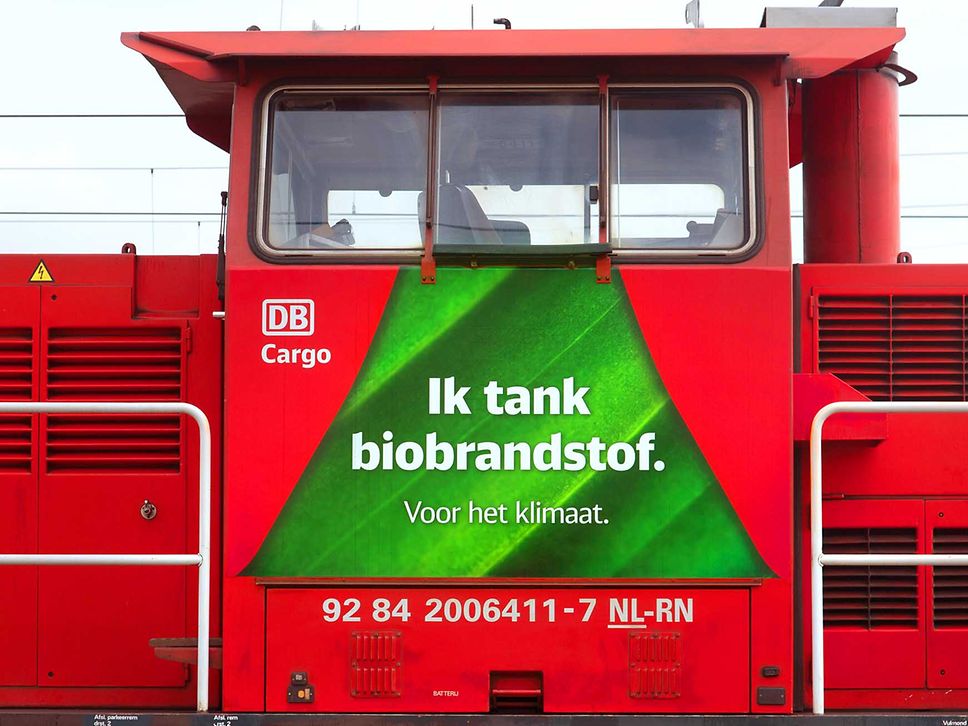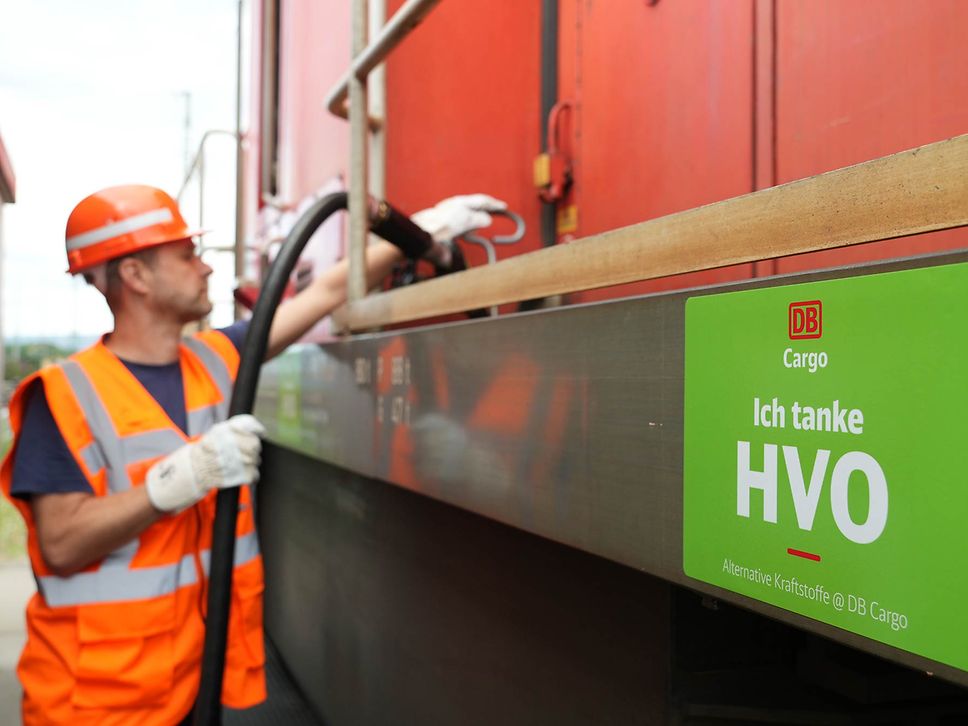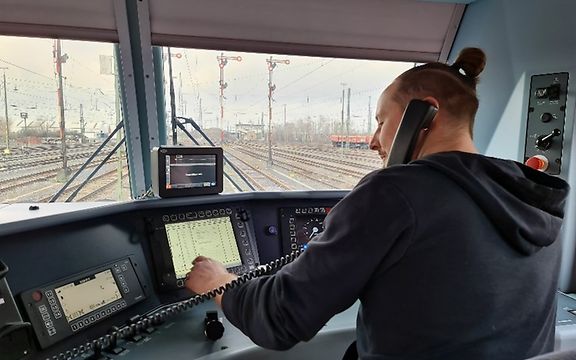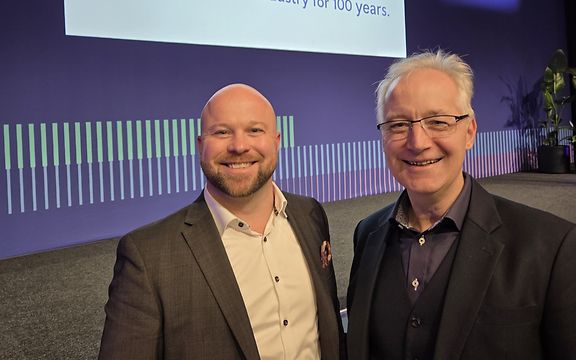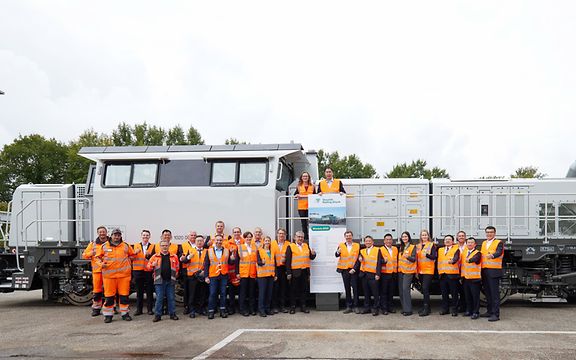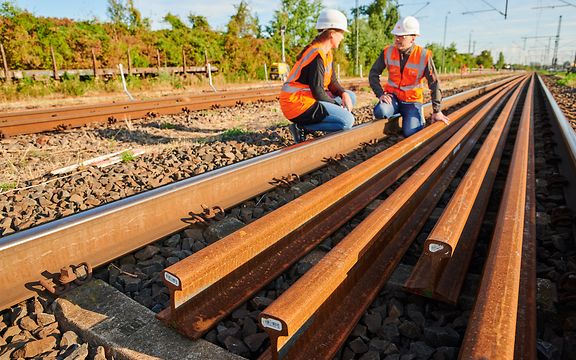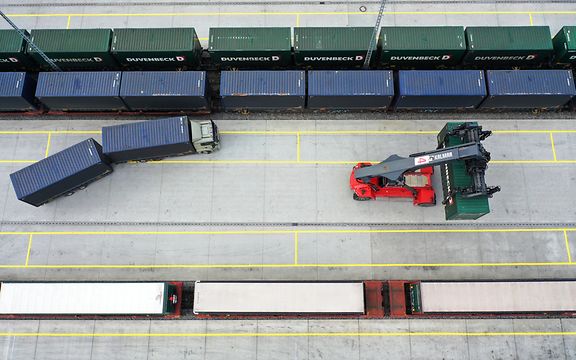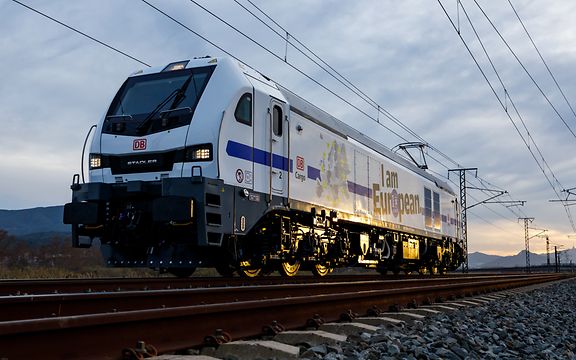DB Cargo 15.04.24
Deutsche Bahn (DB) is setting a definitive course for climate protection. The Group has set itself the ambitious goal of climate neutrality by 2040. This is ten years earlier than recommended by the EU’s European Green Deal. DB has already done a good job of reducing CO2e emissions by almost 70% over the past 30 years. DB Cargo is also actively involved in meeting environmental targets. "Trains are one of the most environmentally friendly ways to transport goods. Each freight train already saves 80 to 100% CO2e compared to road transport," says Patrick Bertman, Head of Product & Pricing Strategies at DB Cargo. "But this is not enough for our 2040 target, which is why we are currently working on concrete solutions for our diesel locomotive fleet."
4 October 2024: DB Cargo wins UIC Sustainability Impact Award 2024 in "HVO100".
At InnoTrans 2024, we received the UIC Sustainability Impact Award 2024 in the "Energy and Decarbonisation" category. The International Union of Railways (UIC) honoured our commitment to the use of HVO100 (hydrotreated vegetable oil) to drive the phase-out of fossil diesel. HVO100 is a high-quality biofuel that is produced from biological residues and waste materials and enables a balance sheet reduction in greenhouse gas emissions of up to 90 per cent.This year, around ten million litres of conventional diesel will be replaced by HVO100 at DB Cargo alone. This award underlines the importance of our measures to reduce fossil fuels and promote sustainable energy in rail freight transport. DB Cargo is actively committed to a green future and is proud to be part of this important initiative.
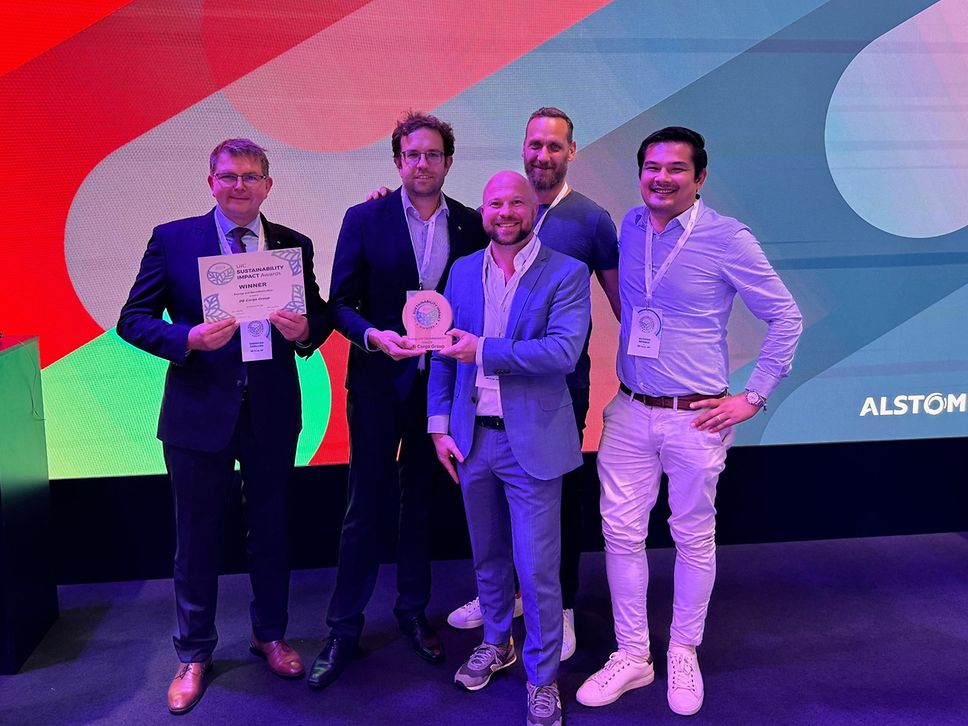
Picture left (from left to right): Sebastian Schilling (Head of Marketing, Transport Policy, Climate Protection and Compliance), Philipp Nowak (Senior project manager Vehicle Projects), Jörg Schneider (Head of Climate Protection and Energy), Mario Lichtenberg (Head of Principles and Testing TecLab) and Sittipan Reinold (Head of Technology Projects and Cooperations).
July 2, 2024: Largest HVO filling station in eastern Germany opens.
The figure is impressive: Around one million liters of HVO 100 will be refueled this year at the rail filling station in the Halle (Saale) marshalling yard, which has been converted to the biofuel. HVO in its pure form (HVO 100) causes around 90 percent less CO2e emissions than fossil diesel. The filling station is not only available to DB Cargo, but also to other rail companies, thus supporting the further expansion of green supply chains on site.
In the latest of now 21 HVO filling stations in Germany, the shunting locomotives used there benefit in particular and thus enable a practically CO2e-neutral supply chain in the region right up to the last mile. Dr. Sigrid Nikutta, DB Board Member for Freight Transport, also focused on this important step at the opening of the filling station: "The best solution is often the simplest solution - and that is exactly what we have done here in Halle: with the largest HVO filling station in eastern Germany, we are making the delivery and supply chains green right up to the last mile. We can use our existing locomotive fleet for this, which is sustainable!" This year, DB Cargo is already filling up with eight million liters of biodiesel across Germany, saving around 25,000 tons of CO2e by rail.
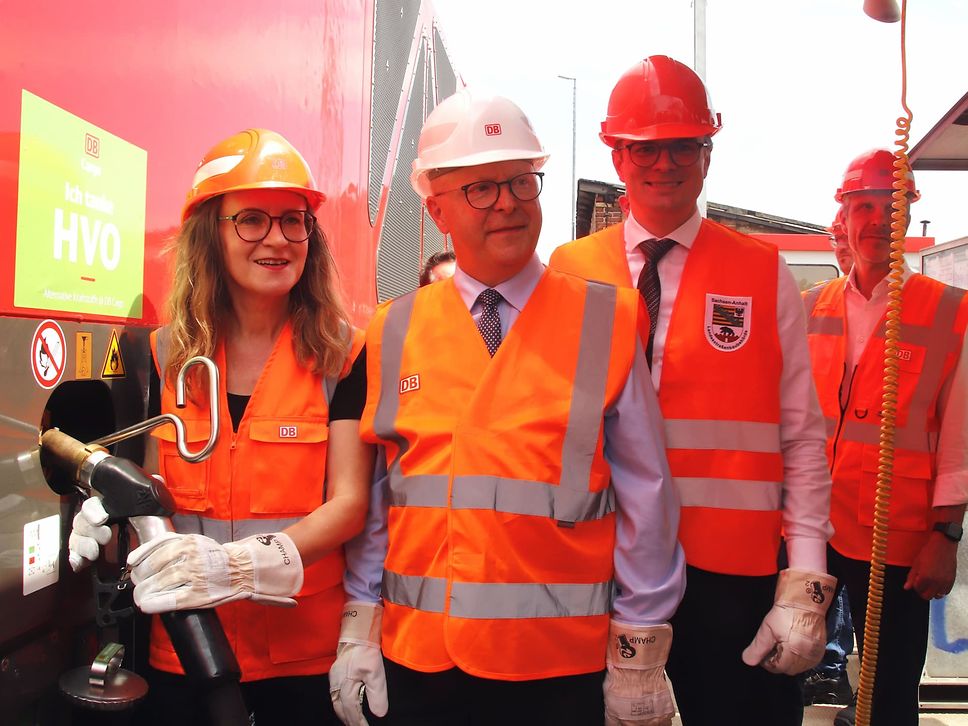
Opening of the largest biofuel filling station in eastern Germany at the Halle (Saale) marshalling yard with Dr. Sigrid Nikutta (DB Board Member for Freight Transport and CEO DB Cargo), Michael Theurer (Parliamentary State Secretary to the Federal Minister for Digital and Transport Affairs and Federal Government Commissioner for Rail Transport) and Sven Haller (State Secretary in the Ministry of Infrastructure and Digital Affairs of the State of Saxony-Anhalt).
25 January 2024: DB Cargo Italia starts refuelling with HVO.
More and more DB Cargo subsidiaries are switching to HVO. DB Cargo Italia S.r.l. has been running its locomotives near Cervignano and Brescia in northern Italy on Neste's HVO biofuel since 25 January 2024. These will soon be joined by transports in Turin and at the Anagni depot. Massimo Leone, Head of Rolling Stock Management at DB Cargo Italia S.r.l., was the driving force behind the adoption of the new fuel in Italy: "By using HVO in Italy, we are not only choosing an environmentally friendly alternative fuel for our locomotives, but also proving that we can successfully implement sustainable innovations in rail transport."
All of the company's locomotives that are designed for HVO now use the new fuel. In terms of performance, the train drivers say they run no differently to conventionally fuelled locomotives. The collaboration with the HVO producer Neste and the dealer Firmin also went smoothly. The operation and rollout of HVO in Italy is therefore a complete success, especially in terms of sustainability.
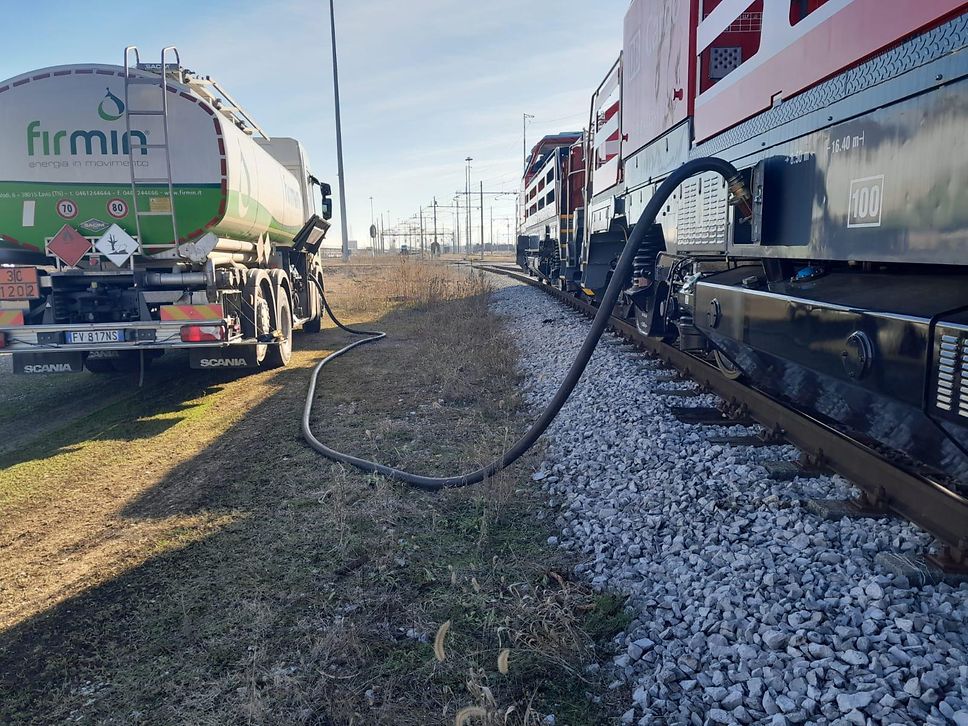
17 July 2023: DB Cargo Netherlands becomes first Dutch rail company to test HVO
For the next six months, a diesel locomotive belonging to DB Cargo's Dutch subsidiary will run on the environmentally friendly biodiesel HVO instead of conventional diesel. The company will test HVO's suitability as a future alternative to fossil diesel in the Netherlands on the route between Eemshaven, Delfzijl and Veendam in the north of the country. The test will focus on aspects like how the engine reacts to the fuel. The outcome is likely to be positive, as all freight locomotives in Germany have already been cleared for HVO.
Contact for HVO in the Netherlands:
Jelle RebbersManager communications & public affairs, DB Cargo Nederland N.V.E-Mail: jelle.rebbers@deutschebahn.com
5 April 2023: Refuelling station at Munich North marshalling yard to use exclusively HVO
DB Cargo has now converted its entire freight locomotive fleet to the environmentally friendly biofuel HVO. To meet this increasing demand, the tank infrastructure for the roughly 800 locomotives is undergoing a further expansion. As a result, the filling station at the Munich North marshalling yard has now been completely converted to HVO. This means that in future, shunting services and the supply of the Bavarian chemical industry will be almost entirely climate neutral. Dr Sigrid Nikutta, DB Board Member for Freight Transport: "We are accelerating the switch to biofuels. We refuelled the first locomotive with HVO here at the Munich marshalling yard about a year ago. Now our entire diesel fleet can use this sustainable fuel. We filled half a million litres last year alone. This year it will be ten million litres. For our customers, this means that environmentally friendly supply chains and around 90% fewer CO2e emissions compared to fossil diesel are now possible all the time – even on non-electrified lines."The facility at Munich North is extremely important, as it will refuel three million of the ten million litres of HVO that DB Cargo plans to use in 2023. These ten million litres will save a total of around 30,000 tonnes of CO2e, with this filling station alone saving around 9,000 tonnes this year. The refuelling station is of course also available to other rail companies that want to improve their carbon footprint and protect the climate.
9 March 2023: Growing tank infrastructure as port of Bremen chooses HVO
The expansion of infrastructure for HVO continues. The next filling station for this environmentally friendly biofuel has been put into operation in Bremerhaven-Speckenbüttel. This makes Bremen the first European port to use only HVO-powered locomotives. The refuelling facility, which is operated by DB Energie GmbH, was funded by the Bremen Senate. "The port of Bremen is playing a pioneering role when it comes to protecting the climate and cutting emissions on the last mile in rail freight transport," says Ali Dogru, Head of Assets and Maintenance at DB Cargo. The company calculates that more than 300,000 litres of HVO a year will be dispensed in Bremerhaven-Speckenbüttel.
3 January 2023: Conversion to HVO ahead of schedule
DB Cargo has already approved its entire fleet of 800 vehicles for biofuel. This is one of the reasons why Deutsche Bahn (DB) is ahead of schedule in its shift away from diesel. At 17 million litres, DB is already on course to use twice as much HVO biofuel in its diesel locomotives in 2023 as originally calculated. This means that the Group will reach the volume target it originally set itself for 2025 two years earlier. The main reason for this is the successful conversion of diesel filling stations to HVO. In addition, positive experiences in operations have boosted confidence in the fuel. In 2022, DB approved around 1,000 vehicles for refuelling with the eco-friendly biofuel HVO. The remaining 2,000 diesel vehicles in the DB fleet will follow over the next five years.
Dr Richard Lutz, Chairman of the Management Board and CEO of DB: "The departure from diesel is a done deal at DB. We are doing everything we can to make the railway even greener. We will invest a total of around EUR 1.5 billion in the expansion of new drive systems and fuels by 2027, gradually bringing us closer to climate-neutral rail."
24 October 2022: HVO available as DBeco fuel in regular operations
Under the name DBeco fuel, the sustainable biofuel HVO has been added to DB Cargo's Eco Solutions product range and has been approved for all diesel locomotives at DB Cargo Deutschland since June. Europe's largest freight operating company is therefore saving a great deal of CO2e on all non-electrified routes as well.
Rolls-Royce releases MTU rail engines for sustainable fuels
The new biofuel is so good that Rolls-Royce is also releasing the first of its MTU rail engines for the sustainable fuel, with other classes set to follow in the near future. By doing so, the renowned manufacturer is also signalling its support for even more environmentally friendly rail transport. Approval of the engines for the eco-friendly fuels requires a series of tests and trials. For this, Rolls-Royce worked together with DB Cargo and RDC Autozug Sylt to test its MTU class 4000 engines with HVO in locomotives. The results were encouraging: "We were able to use HVO in our rolling stock without any problems, and without compromising on performance and reliability," says Ali Dogru, Head of Assets and Maintenance at DB Cargo.
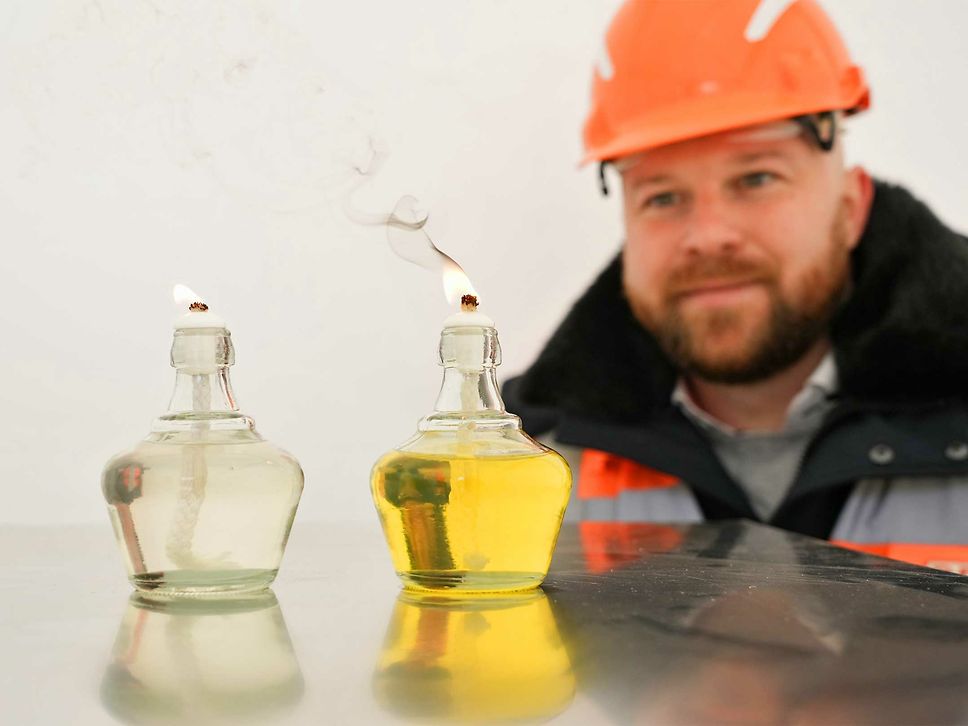
Modern biofuels as part of the sustainability strategy
Locomotives usually have a service life of 40 years. This means that rolling stock procured today will still be running in 2040. In addition, it is not yet technologically possible to do without diesel engines, as alternative drive technologies such as fuel cells are not yet available for the performance ranges required in rail freight transport. "To achieve our environmental goals, we therefore need to optimise the existing system. This means that we must radically reduce the use of fossil fuels and bring it to zero by 2040. That's why our focus is currently on testing alternative fuels," says Jörg Schneider, Head of Climate Protection and Energy.
One of these biofuels is hydrotreated vegetable oil, or HVO for short. This is produced from substances like biological plant and waste residues. What makes this fuel sustainable is the fact that it requires no additional farmland and therefore does not compete with the production of food and animal feed. The biofuel is also free of palm oil. When it undergoes combustion in the engine, it only releases the amount of CO2e that was previously removed from the atmosphere during the growth of the plants. The result is a fossil-free, high-quality biofuel whose chemical structure is very similar to that of diesel. It is therefore intended to replace this fossil fuel in the future. "Using this fuel, we can reduce CO2e emissions by around 90% compared to standard diesel," explains Jörg Schneider. "HVO therefore represents a bridging technology for us." Diesel and shunting locomotives from DB Cargo will in future also be able to deliver a carbon-neutral last mile. In addition, extensive testing has shown that diesel locomotives can use HVO fuel without loss of performance. For DB Cargo's customers, this means that climate-neutral supply chains are possible throughout the journey.
"Sustainability is the new currency in logistics"
As Europe's largest freight operating company, DB Cargo provides around 95% of its traction power electrically. The remaining traction activities are performed in shunting, in container terminals and ports, or when delivering freight wagons to the factory premises of DB Cargo customers. There is now an almost completely CO2e-free solution for this shunting service with freight trains weighing up to 3,000 metric tons.
Dr Sigrid Nikutta, Member of the Management Board for Freight Transport, says: "We have squared the circle. We can now easily run freight trains for our customers in a completely carbon-neutral way using alternative fuels and the existing locomotive fleet. At the same time, we are investing in new technologies and will convert the diesel locomotives to hybrid drives. We can therefore offer our customers tailor-made and eco-friendly supply chains, making ‘Made-in-Germany' value creation green. Many customers have already signalled to us that they are waiting for just that. Sustainability is the new currency in logistics and we are literally making every last metre of the supply chain sustainable!"
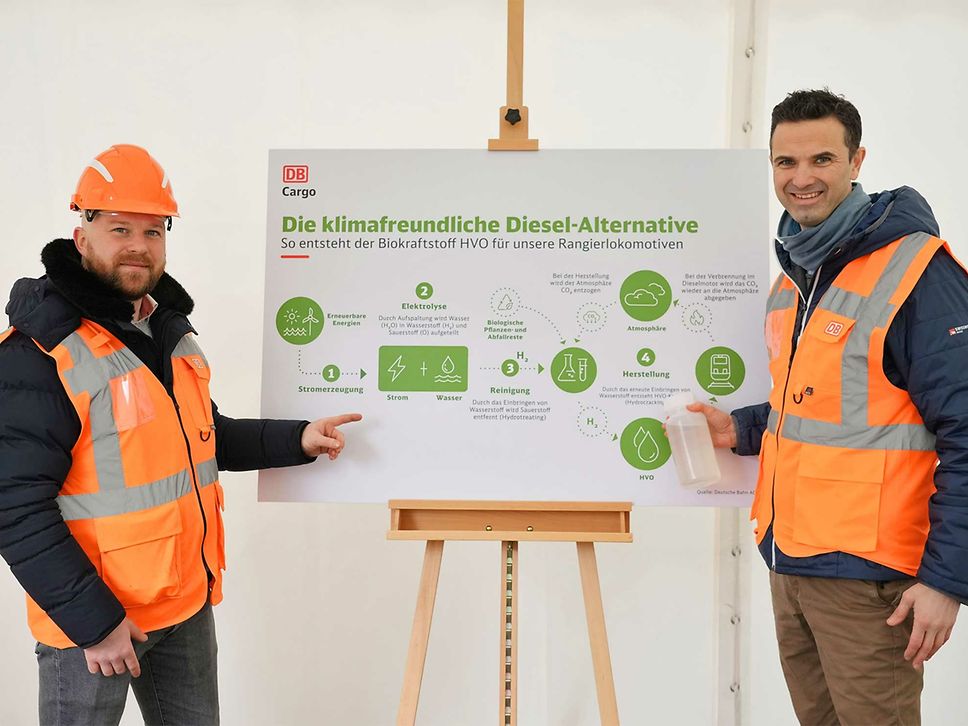
Read more about the HVO tests here: up to 50% less soot content
But before HVO can be launched as a diesel alternative, DB Cargo is putting the biofuel through its paces. The first engine test bench trials took place in mid-August 2021. Certified comparative measurements were carried out with two engine types using conventional diesel and HVO fuel at the facilities of DB Heavy Maintenance in Bremen. DB Heavy Maintenance, DB Systemtechnik, ZECH Umweltanalytik and MTO Engineering acted as DB Cargo's partners, performing and documenting the tests. Project manager Jörg Schneider: "We measured the performance, fuel consumption and emissions to find out what, if anything, we needed to adjust in order to be able to use HVO smoothly in our rolling stock." The result: "The tests were consistently positive. Both the engines and the pre-heating systems all worked perfectly and at full output with HVO." In addition, the blackening rate (soot content) were reduced by up to 50% in some cases. Emissions of the particularly harmful air pollutants NOx (nitrogen oxides) and SO2 (sulphur dioxide) also fell.
Feasibility study ensures practical use
After the engine test bench, the first driving tests with HVO were also successful. The first field tests in real driving operations began at Frankfurt stabling sidings, Kassel and Würzburg in autumn 2021. The schedule included initial test refuelling and numerous test runs with diesel-powered shunting and main-line locomotives. These began on the factory premises then progressed to real working conditions on the track.
During the tests alone, the use of HVO saved more than 160 metric tons of CO2e. In order to gain sufficient experience, the field test will run until mid-2022. "Based on the initial results, we are now preparing a feasibility study in which we will identify future adaptations for the nationwide use of alternative fuels. In other words, the necessary adaptations and conversions on the rolling stock and filling stations so we can switch operations to HVO as quickly as possible." DB Cargo has a clear goal in mind: "We want to offer our customers end-to-end carbon-neutral transport as soon as possible," says Schneider.
DB Cargo UK pioneering HVO
DB Cargo UK is one step further. After the British DB Cargo subsidiary had already carried out successful tests with HVO in 2020, the starting signal was given for a partnership line test with the biofuel at the end of that year. This involved transporting a load of long-welded steel rails for the customer Network Rail from British Steel's factory in Scunthorpe to Network Rail's depot in Eastleigh, Hampshire. The first intermodal trials with Maritime Intermodal also took place in May 2021. A total of 19 trains, running entirely on HVO, operated between the Port of Felixstowe and Maritime's new East Midlands Gateway infrastructure facility during the trial period. "We are delighted to have been able to work with both Network Rail and Maritime Intermodal. This has ultimately led to a significant reduction in CO2e emissions," says Roger Neary, Head of Sales at DB Cargo UK. "In addition, the partnerships have provided us with a great deal of insight that allows us to use HVO fuel as a viable, innovative alternative to conventional diesel in our freight fleet as soon as possible."
Learn even more about HVO here
- HVO is made by converting plant waste residues into hydrocarbons by means of a catalytic reaction with the addition of hydrogen.
- HVO offers high energy efficiency and energy density. This is slightly lower than that of fossil diesel, resulting in a slight increase in consumption of 0.5 to 2%
- Due to its similar properties, HVO can be blended with fossil diesel fuel or even used as a pure substance.
- The CO2e savings potential over the entire life cycle (generation with renewable energy and consumption) is around 90%. Soot and nitrogen oxides are also reduced.
- HVO is less sensitive to cold (down to -40°C) and has a longer storage life than fossil diesel. This enables smooth winter operation and longer usability.
- HVO meets the specifications of EN 15940 for paraffinic diesel fuels and therefore has a higher quality than the standard for biodiesel set out in the EU standard EN 14214.
- Currently, HVO still costs somewhat more than fossil diesel fuel. Due to the rising cost of diesel, we expect this price gap to shrink in future.
Other alternative fuels
DB Cargo is also planning to use other alternative fuels in the future. The focus here is on synthetic, i.e. artificially produced fuels, as well as so-called air-to-fuel (A2F), which even allows CO2e savings of 100% and therefore climate-neutral operation. The catch at the moment is that A2F fuels are not widely available on the market, if at all, and currently still cost several times the price of regular diesel. "But that should change in the next few years, we're staying on the ball," says Jörg Schneider, Head of Development & Best Practices and Head of Energy Management Project at DB Cargo.
